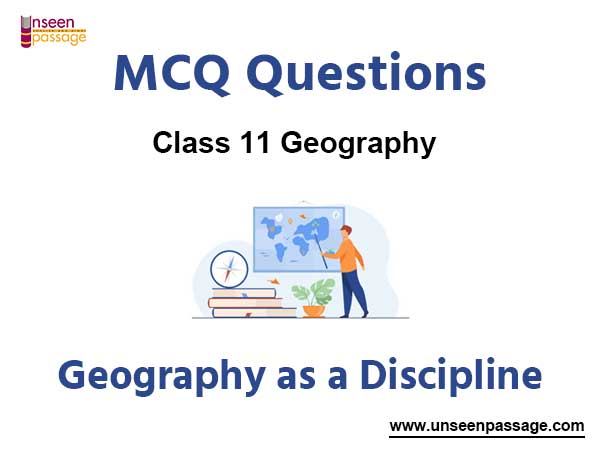Geography as a Discipline MCQs Class 11 Geography
Please refer to Chapter 1 Geography as a Discipline MCQs Class 11 Geography with answers below. These multiple-choice questions have been prepared based on the latest NCERT book for Class 11 Geography. Students should refer to MCQ Questions for Class 11 Geography with Answers to score more marks in Grade 12 Geography exams. Students should read the chapter Geography as a Discipline and then attempt the following objective questions.
MCQ Questions Class 11 Geography Chapter 1 Geography as a Discipline
Geography as a Discipline MCQ Class 11 Geography provided below covers all important topics given in this chapter. These MCQs will help you to properly prepare for exams.
Question. Who introduced the regional approach?
a. Karl Ritter
b. Humboldt
c. German geographer
d. all of them
Answer
A
Question. To which cropping pattern is related
a. soils
b. climates
c. market
d. all of them
Answer
D
Question. The economic activities of the people are studied in
a. Historical geography
b. Economic geography
c. Political geography
d. none of these
Answer
B
Question. Which of the following is not studied under population geography?
a. Sex ratio
b. Migration
c. Pollution
d. Population
Answer
C
Question. Which one of the following disciplines attempts temporal synthesis?
a. Sociology
b. Geography
c. Anthropology
d. History
Answer
A
Question. Which one of the following disciplines attempts temporal synthesis?
a. Sociology
b. Geography
c. Anthropology
d. History
Answer
D
Question. The major issue for environmental geography is
a. scientific study of the habitats
b. pollution, land degradation, and conservation of the environment
c. geographic characteristics of animals and their habitats
d. population explosion
Answer
B
Question. Geography is concerned with the description and explanation of the areal differentiation of the earth’s surface. Who said it?
a. Herodotus
b. Erathosthenese
c. Richarde Hartshorne
d. Galileo.
Answer
C
Question. In India Himalayas have acted as a great barrier to
a. protect
b. to rainfall
c. routes to migrants
d. none of them
Answer
A
Question. The geographical phenomenon is
a. dynamic
b. static
c. both
d. none of them
Answer
A
Question. The study of oceans, seas, lakes and water realm is known as
a. hydrosphere
b. atmosphere
c. biosphere
d. lithosphere
Answer
A
Question. Which tool is used to find out exact location?
a. GIS
b. GPS
c. both
d. none of these
Answer
B
Question. The study of soil formation is devoted to the study of
a. Soil geography
b. Soil fertility
c. Soil distribution
d. none of these
Answer
A
Question. The study of population growth, distribution, density, sex ratio, migration, etc. falls under which branch of geography?
a. Physical geography
b. Human geography
c. Bio-geography
d. Philosophy
Answer
B
Question. How human beings have come to terms with the nature?
a. through adaptation
b. through modification
c. through primitive societies
d. all of them
Answer
D
Question. The study of land forms, their evolution and relation with processes is
a. Climatology
b. Hydrology
c. Geomorphology
d. Pedology
Answer
C
Question. Which one of the following scholars coined the term ‘Geography’?
a. Herodotus
b. Erathosthenese
c. Galileo
d. Aristotle.
Answer
B
Question. Which one of the following is the concern of geography?
a. To find the relationship between two country
b. To find the relationship between two parties
c. To find the relationship between any two phenomena
d. None of these
Answer
C
Question. Plateaus provide
a. minerals
b. forests
c. both
d. none of these
Answer
C
Question. Regional geography helps in identifying the
a. realms
b. regions
c. distributions
d. problems
Answer
B
Question. How human beings have come to terms with the nature?
a. through adaptation
b. through modification
c. through primitive societies
d. all of them
Answer
D
Question. We study under physical geography:
a. Weather, soil, atmosphere, etc.
b. Agriculture
c. Population, Industry
d. Urban and rural settlement.
Answer
A
Question. Geography studies the differences of phenomena usually related in different parts of the earth’s surface. Who gave this definition?
a. Hambolt
b. Ratzel
c. Kumari Sample
d. Alfred Hartner.
Answer
D

